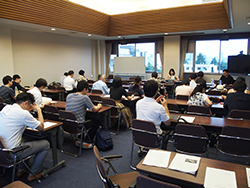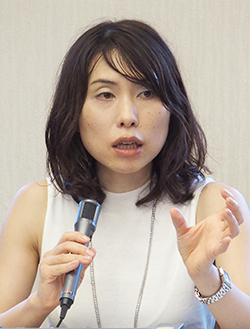IGS seminar: The Liberal International Order and America
The IGS seminar, “The Liberal International Order and America,” was held on July 24, 2017. Seiko Mimaki (Takasaki City University of Economics), author of The Age of the Movement to Outlaw War (Nagoya University Publishing, 2014), was invited to present a report, which was followed by a round table discussion about “the possibility of a liberal international order,” with Hiroaki Sakai (Ochanomizu University IGS) serving as MC, and speakers Ms. Mimaki, Mr. Ikuo Gonoi (Takachiho University), Ms. Ki-young Shin (Ochanomizu University IGS), Ms. Chikako Nakayama (Tokyo University of Foreign Studies), and Mr. Yukio Maeda (Soka University) engaging in discussion.
Ms. Mimaki began by sharing her report, which had the same title as that of the seminar “The Liberal International Order and America.” The report contained four main arguments. First, “a liberal international order without American leadership” Ms. Mimaki, analyzed the forces at play behind Trump’s rise to power—the forgotten people who support him (the vulnerable and disadvantaged people who require support from the government and society, and the hard-working middle classes displeased with the burden of supporting those vulnerable groups). She also analyzed Trump’s America First policy from the perspective of those Americans who believe in it the most.
Second, “the global order in the post American age: is there a future for the liberal international order?” The following points were discussed: (1) an unstable “G Zero World” (Ian Bremmer) and (2) post hegemony “a multiplex world, not a multipolar one” (Amitav Acharya). It was highlighted that the truth behind the postwar liberal internationalism must be critically reexamined from the perspective preserving the liberal international order that has existed in the 70 years since the end of World War II.
Third, “was America ever the leader of the liberal international order to begin with? A critical exploration.” America continues to practice double standards, those behind the human rights diplomacy employed by America in the past, despite discrimination against the Blacks within America, and the calculated relaxation of human rights diplomacy in strategically valuable regions.
Fourth, “a new American identity in the post America age: reconsidering Obama’s diplomacy.” A critical evaluation of attempts at internationalism within Obama’s diplomacy were provided—its continuity with Trump’s diplomacy on the one hand (with respect to refusing to be “the world’s policeman” and fighting ”dirty wars” through the use of drones), while departing from Trump’s diplomacy on the other (overcoming American exceptionalism and position on coexisting with multiple civilizations). The theme of this section was “from the Americanization of the globe, to the globalization of America: Obama’s challenges and setbacks.”
During the round table, Mr. Maeda pointed out that “what is necessary to revive the liberal international order” is continued scrutiny of the relation between democracy and capitalism. Concerning Obama’s evaluation, he was critical on the lack of an option to reject war. Further, he discussed the religious situation within the U.S. (particularly the problem of evangelicals), civil rights movement leaders, and the need to bring their message to a wider audience and not just to the elites.
Mr. Gonoi, from the perspective of American democracy during the 20th century, spoke about American pragmatism, putting practice before theory (taking action first/gradual improvements), and welcoming diversity as evidenced by the presence of “hyphenated Americans.” He pointed out that this was an attribute of America at that time and expressed confidence in the future promise of that culture. Further, the ability of black Americans to transcend their repression and become full citizens, the civil rights movements in support of diversity, and the impact of the Obama presidency, he added, cannot be overestimated.
Ms. Nakayama asked, “politically-speaking, where were the hard-working middle class supporters of Trump during the Obama years? What did they expect from Obama?” Further, he added that liberalism reached a dead end when, at the start of the 20th century, the modern meaning of the word “peace” took on a negative connotation. At that point, if the elites were considered to be chiefly concerned with peace, then that perhaps explains the masses’ susceptibility to fascism and the fall of liberalism.
Ms. Shin added that the liberal order is neither peaceful nor pacifist. Accordingly, she asked, “in any of the three scenarios—the unstable G zero world, the multiplex post hegemony world, and the scenario of a continuing liberal international order—why doesn’t pacifism fit into any of them?” From a gender perspective, she raised the possibility that the liberal international order’s heretofore preoccupation with security has dominated international discourse, and because the male perspective has become the dominant paradigm, pacifism and nonviolence have simply been overlooked.
The gendering of national security, in other words the procurement of weapons and international relations relating to national defense, is a threat to ordinary safety, resulting in opposition to those activities. For example, in the U.S. Congress, there were 388 votes in favor of the resolution to declare war on Japan. The lone vote against was cast by Janet Rankin. Pacifists must follow her example in involving themselves in international relations. Another example is of Beate Sirota Gordon, who wrote the draft of Article 24 of Japan’s constitution concerning family activities, the inviolate rights of the individual and equality between men and women. Women have contributed to the cause of pacifism in diverse roles, and they participate in consciousness formation, challenging the dominant male national security paradigm and building a more desirable one in the cause of peace.
Following these comments, Ms. Mimaki addressed some of the many issues raised during the round table. Lively discussion regarding issues such as whether or not the preservation of the liberal international order would be good for the world and what role Japan should play in the international order going forward ensued.




